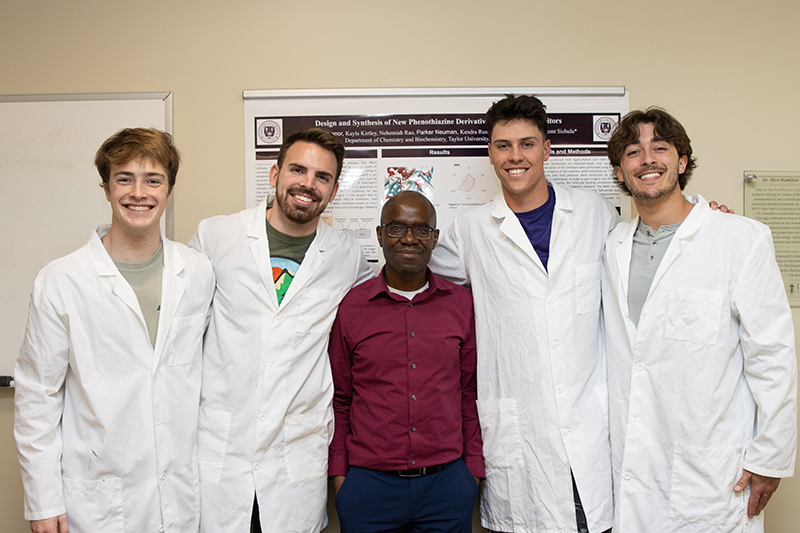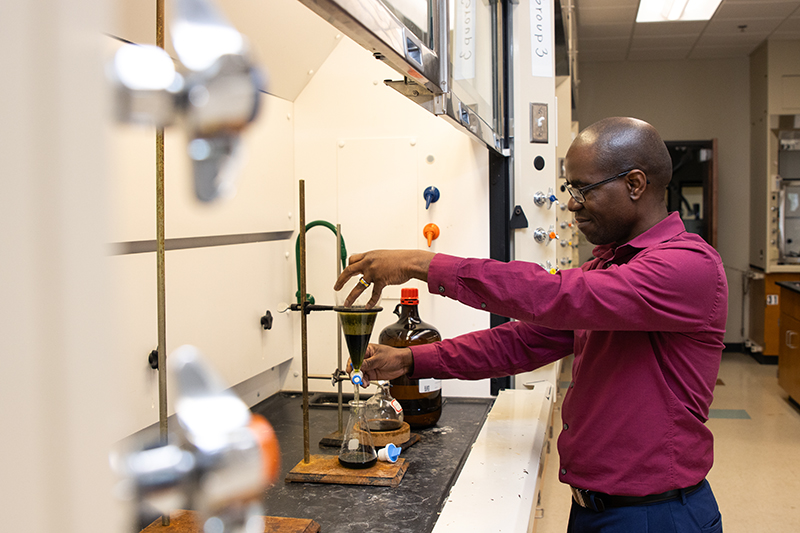- About
- Admissions
-
Academics
- Undergraduate Programs
- Pre-Major
-
Departments
- Overview
- Art Program
- Biblical Studies, Christian Ministries, Intercultural Studies & Philosophy Department
- Biology Program
- Business Department
- Chemistry Department
- Communication Department
- Computer Science & Engineering Department
- Education Department
- Engineering Program
- English Program
- Environmental Science & Sustainable Development Program
- Film & Media Program
- History, Global & Political Studies Department
- Kinesiology Department
- Mathematics Department
- Modern Languages Program
- Music Program
- Physics Program
- Psychology Department
- Social Work Program
- Sociology Program
- Theatre & Dance Program
- Liberal Arts
- Study Abroad
- Graduate Programs
- Online Programs & Licensures
- Special Programs
- Academic Enrichment Center
- Life at Taylor
Info For
Chemistry Professor Leads Students in Cancer, Parkinson’s, Alzheimer’s Research

Professor of Chemistry Dr. Vincent Sichula, PhD, is leading organic chemistry students in researching ways to combat cancer, Parkinson’s disease, and Alzheimer’s disease.
His studies and the places those studies take his students after college are a testament to the weight that college experience with research has in the eyes of graduate schools and employers, especially in a difficult field like Chemistry. His aim isn’t just to help students gain experience, however.
“I tell my students, ‘You see these compounds we are making?’” Sichula said. “‘Don’t be surprised if you find these compounds are being developed into pharmaceutical drugs one day. You never know where they’re going to lead us.’”
The Research
One area of Sichula’s research is on the preparation of organic molecules for pharmaceutical drug development.
In the past, before computational technology, scientists tested thousands of molecules randomly against a single disease target. This process bore many errors and took up time and resources, but today’s technology enables Sichula and his students to simulate reactions between molecules and disease targets.
One of his research studies is focused on finding compounds that can inhibit a crucial enzyme found in Parkinson’s disease.
“We have made the molecules, and we have tested them, and so far, the results have been very encouraging,” Sichula said. “We presented the data from this project at the American Chemical Society Conference in Chicago last year.”
Sichula is also the lead investigator on another project concerning cancer research. The molecules he is looking for are those related to angiogenesis—the formation of new blood cells. One of Sichula’s students presented the research data to the American Cancer Society.
Sometimes, research in one area leads to success in another area. Sichula experienced this early in his career when his research centered around skin cancer. He ended up finding a compound that could split water into hydrogen and oxygen.
It just so happened that companies were searching for a way to use water as a fuel source. This compound provided a way to convert hydrogen and oxygen into fuel cells that generate electricity.
“During my PhD, I gained experience in renewable energy research,” Sichula said. “Now, I engage students in renewable energy.”
This is done through Sichula’s third research project, where he is looking to make molecules that could convert carbon dioxide—a greenhouse gas—into liquid fuels such as methanol. Through this research, he hopes to find an alternative method of reducing carbon dioxide from the atmosphere and at the same time converting it into fuels.

Preparation for the Future
Whether or not Sichula’s students pursue medical chemistry as a career, they learn many skills during their time in the organic chemistry lab, and many financial opportunities and careers become accessible to them.
Some Chemistry and Biochemistry majors, for example, may plan to become dentists or take up other occupations that require a graduate school degree.
“It really helps students get internships, jobs, admissions into universities and medical school because the admission officers are interested in what they’ve done besides their coursework,” said Sichula. “It helps students to get into good programs.”
Experience in research and lab work has another benefit. Students who wish to pay for their graduate degrees by doing research for their school already have experience. Sichula himself did this while getting his PhD in Chemistry.
Sichula’s students cultivate their critical thinking skills, precision, and coordination.
“I would say if you’re interested in the sciences, chemistry is the best place to begin,” Sichula said.
A Greater Purpose
For Sichula, his work is more than a humanitarian occupation; it’s Kingdom work.
“It’s another way of doing God’s work, contributing to the redemptive plan of God,” Sichula said. “Just imagine, the Scripture says God forgives all our iniquities and heals all diseases. So just to be part of that, you can make these molecules and they can do amazing things.”
Sichula urges his students to see God as the grand Designer who orchestrates all of nature. Human processes cannot compare to the inner workings of God’s creation.
“You know, first you make one compound and purify it,” Sichula said. “Then you mix it again with another one, make another one, check the temperature and everything before we get to the final product. But then the question is, how does nature do that? God is a Creator and a Designer.”
Are you interested in pursuing a great purpose through your education? Learn more about our American Chemical Society-certified Chemistry and Biochemistry Department, its 95% placement rate into medical and pre-healthcare schools, its near-100% placement rate into graduate schools, and its 99% placement rate for direct entry into a chemistry career.
Want to see it for yourself? Schedule a visit today!

